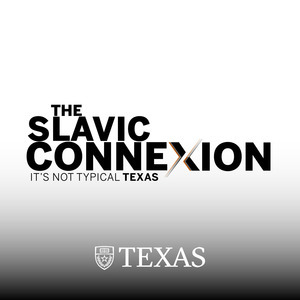The Slavic Connexion
A fresh international chat show on Russia, Eastern Europe, and Eurasia from The University of Texas at Austin
About the show
A fresh international chat show on the Slavic world from the Center for Russian, East European, and Eurasian Studies and the William P. Clements, Jr. Center for National Security at The University of Texas at Austin. "It's not typical Texas."
The Center for Russian, East European, and Eurasian Studies condemns the Russian Federation’s military invasion of Ukraine. We stand in support of the people of Ukraine who are fighting for their lives and sovereignty in the face of the unjustified invasion by Russian military forces.

Texas Podcast Network is brought to you by The University of Texas at Austin. Podcasts are produced by faculty members and staffers at UT Austin who work with University Communications to craft content that adheres to journalistic best practices. The University of Texas at Austin offers these podcasts at no charge. Podcasts appearing on the network and this webpage represent the views of the hosts, not of The University of Texas at Austin.
The Slavic Connexion on social media
Episodes
-
Shifting Sands: The Middle East and North Africa in Russia's War in Ukraine
October 25th, 2022 | Season 5 | 40 mins 27 secs
geopolitics, middle east, opec, russia, security, ukraine, war
On this episode, guest Nicole Robinson expounds on the region geographically and strategically situated in between giants: the Middle East. She explains how MENA countries have responded to Russia's War in Ukraine and sheds some light on the future of the region as the conflict evolves and Russia's capacity to arm and feed its regional allies dwindles.
-
"Ingredients of Change": History of Food in Bulgaria with Mary Neuburger
October 21st, 2022 | Season 5 | 42 mins 23 secs
balkans, culture, food history, soviet history
On this episode, Taylor talks with the director of CREEES, Dr. Mary Neuburger, about her latest book entitled Ingredients of Change: The History and Culture of Food in Modern Bulgaria. Thanks for listening!
-
"The Fastest Game in the World" with Bruce Berglund
October 14th, 2022 | Season 5 | 48 mins 9 secs
canada, eastern europe, history, hockey, olympics, putin, soviet union, sports
On this episode, Eliza talks with sports historian Bruce Berglund who shares his expertise on the global development of hockey, the rise of the sport in Eastern Europe and the Soviet Union and its role in the expression of national identity on the international stage. Thanks for listening!
-
Putin's War in Ukraine: Mobilization, Annexation, and the Coming Winter
October 7th, 2022 | Season 5 | 42 mins 13 secs
current events, politics, putin, russia, ukraine, war
On this episode, Lera and Taylor welcome returning guest Leonid Ragozin who candidly updates us on the war in Ukraine and helps us make sense of the fog of this conflict and the continual stream of headline-making actions emanating from the Kremlin.
-
Putting Poland, Ukraine, and Russia in Context with Norman Davies
September 28th, 2022 | Season 5 | 34 mins 33 secs
europe, history, poland, politics, russia, ukraine
On this episode, luminary historian Professor Norman Davies joins us to talk about the state of Polish studies, the deep history of Ukraine when it was ruled from Warsaw and Krakow, and the importance of broadening European and Slavic studies as taught in academic spaces. This episode was all about historical context, so we hope you enjoy. Thanks for listening!
-
"Black Garden Aflame": The Nagorno-Karabakh Conflict with Artyom Tonoyan
September 21st, 2022 | Season 5 | 56 mins 10 secs
armenia, azerbaijan, caucasus, conflict, geopolitics, history, russia, turkey, war
On this first episode of season 5, Lera and Zack talk with Dr. Artyom Tonoyan about the ongoing Nagorno-Karabakh conflict, delving into the history of tensions between Armenia and Azerbaijan, Russia's role and presence as mediator, and the various geopolitical vectors in the region. Thanks for listening!
